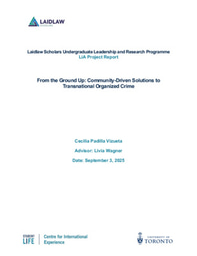End‑of‑Programme Reflection: My time as a Laidlaw Scholar in a nutshell
When I applied to the Laidlaw Scholars Programme, I was hoping to gain research experience. In retrospect, I could not have imagined how profoundly the programme would shape my academic interests, personal growth and understanding of leadership. Two summers later I can see how each component of the programme built on the last to create a holistic, meaningful experience.
My journey began in the summer of 2024 with a research project on Ecuador’s belated integration into a regional trend of organised crime. Under the guidance of Professor Montoya, I spent my days going over political histories and building theoretical frameworks. It was the first time I’d driven a project from question to conclusion, and it taught me to be rigorous, patient and curious. I learned to navigate academic literature, design a methodology and, perhaps most importantly, embrace uncertainty. There were moments when my data didn’t fit my hypotheses or when a source contradicted what I thought I knew. Instead of viewing these as failures, I was encouraged to see them as ways of refining my thinking. By the time I submitted my research report, I had not only explored why Ecuador’s organised crime landscape looked different from its neighbours but also honed a skill set of critical analysis, persistence, independence that I would carry into my second summer.
Between those two summers, the programme gave us regular leadership workshops and bonding activities that connected theory to practice. One of the most memorable was the weekend retreat at Hart House Farm. Away from our busy schedules and city noise, our cohort sat around sharing stories about our backgrounds and aspirations. It was here that I first felt the true depth of the Laidlaw community. People I had only spoken to in a “networky” environment were slowly becoming friends. That sense of camaraderie carried into the academic year through the leadership sessions. We explored our strengths using tools like the Clifton Strengths, and overall learnt more about ourselves. These sessions involved team‑building exercises like an escape room where we had to solve puzzles together. As these mirrored real leadership challenges, I realized that effective leadership is often about listening, delegating and trusting others rather than trying to control every outcome.
By the time my second summer approached, I felt more grounded in who I was as a leader and researcher, but nothing could have prepared me for as big of a leap as Vienna was. My Leadership‑in‑Action placement with the Global Initiative Against Transnational Organized Crime (GI‑TOC) in Vienna turned my academic interest in organized crime into lived advocacy experience. Within days of arriving, I found myself analyzing UN documents, drafting position matrices and preparing for negotiations on new conventions. It was intimidating to shift from a student project to a global policy arena, but the skills I developed during my first summer proved invaluable. And the leadership lessons from our monthly workshops echoed constantly: ask questions, value every team member’s input, and be aware of how your strengths play out in different contexts.
Living abroad for the first time added another layer of learning. Navigating Vienna’s public transport, picking up basic German phrases and forging friendships with colleagues from around the world expanded my cultural fluency and empathy. It wasn’t always smooth; I felt out of place when I couldn’t understand a conversation or when I made mistakes in the office kitchen. But those moments taught me humility and resilience. They reminded me that leadership also involves embracing vulnerability and acknowledging when you don’t know something and reaching out for support.
Throughout this second summer, I saw how the different parts of the Laidlaw programme intertwined. The research methods from my first project helped me quickly digest and summarize complex UN documents in my second summer. The leadership frameworks we discussed during bonding sessions guided my interactions with colleagues and diplomats. Even the escape room exercise proved relevant when, during a particularly tense meeting, I had to rely on collective problem solving. Most importantly, the emphasis Laidlaw places on values like integrity, courage, and curiosity served as an anchor. When faced with sensitive topics like egg trafficking or when advocating for human‑rights language in the cybercrime treaty, I drew on the programme’s insistence that leadership is as much about ethics as it is about efficacy.
Looking back over the entire programme, a few themes stand out. First, growth happens at the edges of your comfort zone. In both summers I was pushed to take on responsibilities that scared me, whether leading a research project or speaking up in a UN negotiation. Each time, I discovered new capabilities. Second, leadership is relational. The most meaningful lessons came not from textbooks but from people: mentors who challenged me, peers who collaborated with me, and communities who supported me. Third, strengths and weaknesses are often two sides of the same coin. My attention to detail helped me go through analyses, but it sometimes led me to micromanage; my assertiveness allowed me to advocate for human‑rights language, but it also made me prone to stubbornness if I wasn’t careful. Acknowledging these dualities was a key takeaway from our leadership workshops.
As I conclude my time in the Laidlaw Scholars Programme, I feel immense gratitude. I’ve gained research skills, professional experience and, perhaps most importantly, a clearer sense of who I am and how I want to contribute to the world. The programme’s holistic design of combining independent research, international experience and leadership development allowed me to explore my passions in a supportive yet challenging environment. I leave with lasting friendships and mentors I admire. Most of all, I carry forward the conviction that evidence‑based research, ethical leadership and a commitment to community can make a tangible difference in combating phenomena like organized crime and beyond.

Please sign in
If you are a registered user on Laidlaw Scholars Network, please sign in